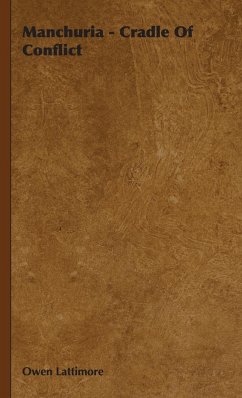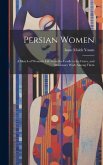MANCHURIA CRADLE OF CONFLICT by OWEN LATTIMORE. Originally published in 1931. INTRODUCTION: THIS book is founded on the experience gained during about nine months of travel and residence in Manchuria, in 1929-30, under a fellowship from the Social Science Research Council, New York. Previous experience on the borders of China and Inner Mongolia, and a long journey through Mon golia and Chinese Turkestan, had convinced me that a study of Manchuria must be essential to an understanding of the vast territory that lies between China and Russia. Manchuria, Mongolia and Chinese Turkestan were once important as the lands in which the northern barbarians of Chinas frontier maneuvered in war and migration, working out among their own tribes their destinies of conquest in China or migration toward the West. They are now becoming a field of contest between three types of civilization the Chinese, the Russian and the Western. In our generation the most acute rivalry is in Manchuria, and the chief protagonist of the Western civilization is Japan whose interpretation and application of a borrowed culture is of acute interest to the Western world, as on it turns to a great extent the choice which other nations have yet to make between their own indigenous cultures and the rival conquering cultures of Russia and the West. During our stay in Manchuria my wife and I tried to make our experience as varied as possible, but at the same time to stay long enough in each region studied to insure that our impressions should not be too superficial. Thus we spent part of the winter in one room at an inn, in a mud-walled boom town on the Western frontiers of Manchuria, where Chinese colonists are rapidly taking over Mongol pastures and opening them to cultivation. Then we moved to another one room lodging in an old thatched schoolhouse, in a small town in Kirin province, where the population was old-fash ioned and predominantly Manchu. In the spring I went up again to the Western frontiers and traveled, first by military motor convoy and then riding with border troopers, among the Mongols. When the ice broke up on the great Sungari river, I traveled on one of the first steamers down to the junction of the Sungari with the Amur about four hundred miles. As the steamers were afraid to venture into the Amur, no settlement having yet been made of the dispute between China and Russia, I traveled on by cart, with a good deal of difficulty, for some distance along the flooded banks of the Amur, among the Fishskin Tatars. Later in the summer I visited Hailar, in the Barga region. In the intervals between traveling, or making long stays in the country, we visited the chief cities Mukden, Dairen, Harbin and Kirin city or made short stays at smaller towns, or in villages, or at temples in the hills. In the larger towns we naturally did our best to meet well-informed people of all nationalities, but out in the country we rarely saw a for eigner, and often went for weeks without speaking English except to each other. As we traveled very simply, had no need of an interpreter, used always the same means of travel as the people of the region and lived in the same kind of houses or inns, our contact with the life about us was as close as possible. We were thus able to collect a great deal of local tradition not only legend and folklore, but the memories of the older inhabitants besides noting the signs of that modern progress which is the chief enthusiasm of the younger generation...
Hinweis: Dieser Artikel kann nur an eine deutsche Lieferadresse ausgeliefert werden.
Hinweis: Dieser Artikel kann nur an eine deutsche Lieferadresse ausgeliefert werden.








